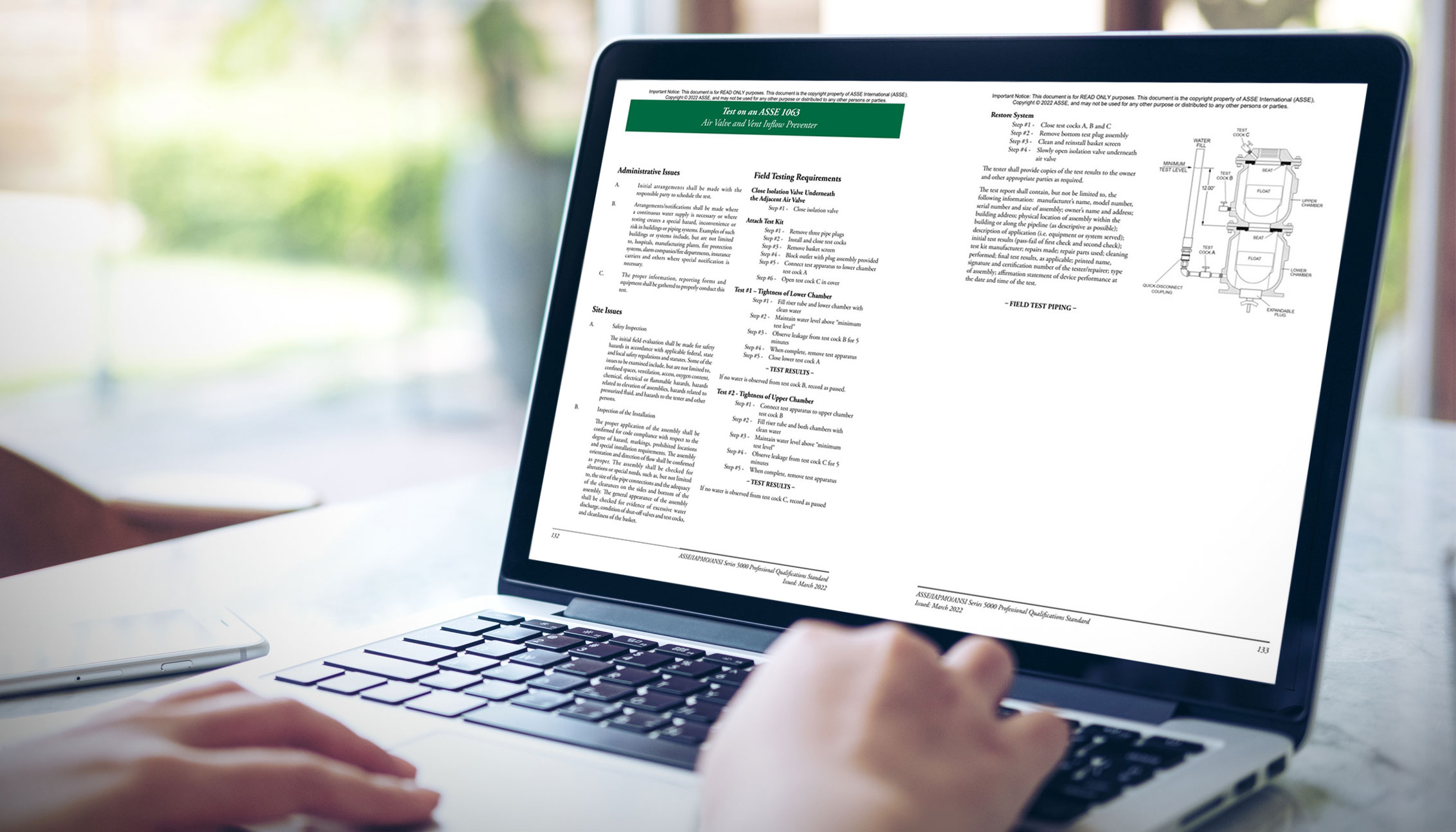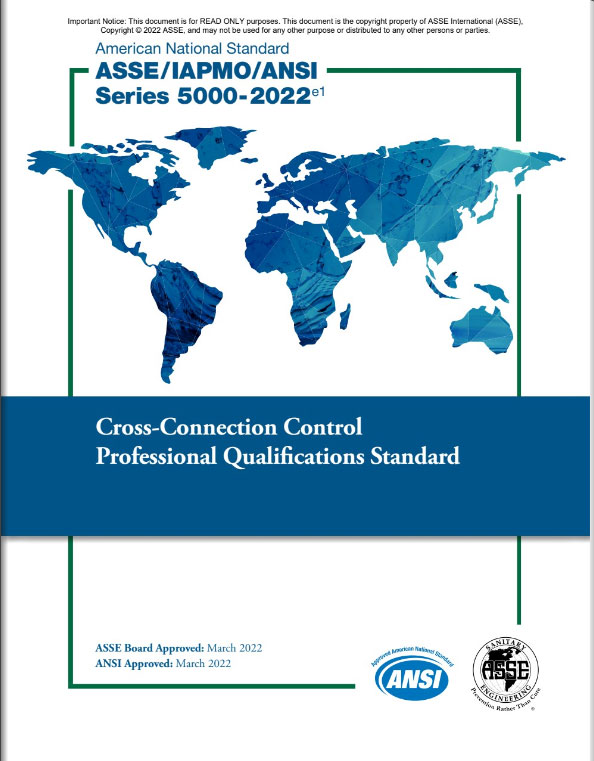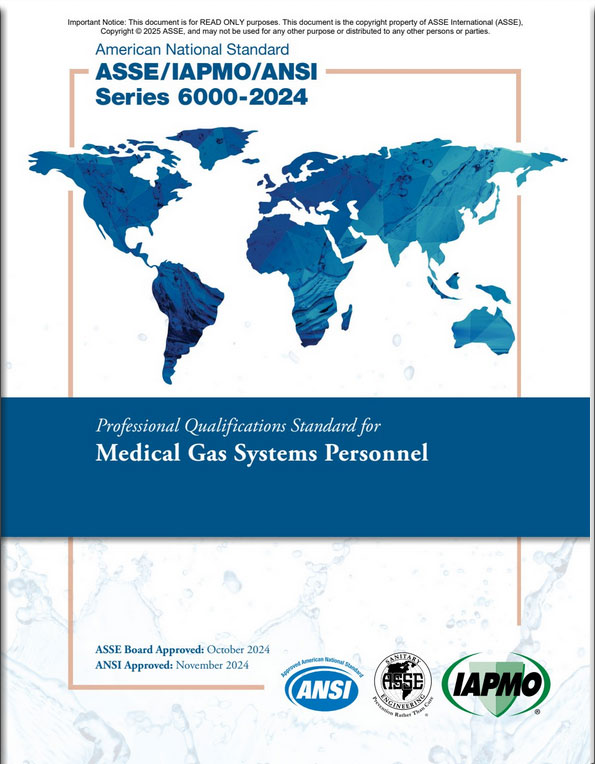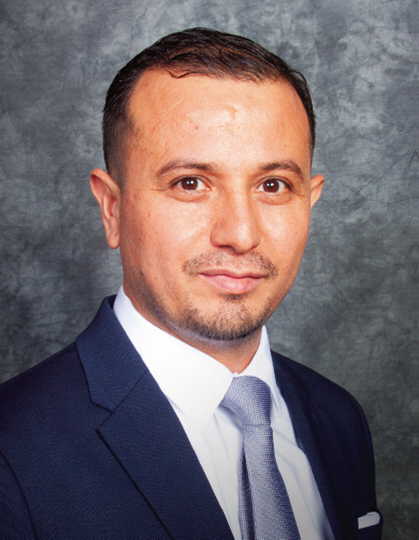
ASSE International has long stood at the forefront of public health and safety through its development of rigorous performance standards and professional certifications. From its early accreditation by the American National Standards Institute (ANSI) in 1988 to its current role as a global leader in cross-connection control, fire protection, and water quality management, ASSE continues to shape the future of the plumbing and mechanical industries. Developed and maintained under ANSI and the Standards Council of Canada (SCC) accredited standards development process, ASSE International Professional Qualification standards set the minimum education and performance requirements for professionals who test, install, inspect, and maintain the system.
Initiation of a Professional Qualification Standard
ASSE maintains 14 ANSI-approved Professional Qualification (PQ) standards, with others in development. A PQ standard starts with a request. Some of the recent requests have been for a PQ standard for inspectors inspecting cured-in-place-pipe rehabilitation of plumbing drainage systems (ASSE Series 28000 and ASSE Series 22000 for water treatment equipment personnel). Therefore, it all starts with the application to request the development of an ASSE PQ standard. As part of the request, the suggested scope needs to be provided, the segment of the industry it would serve, and ways that the standard will improve or protect the public’s safety, health and/or welfare.
The request form to request the development of an ASSE PQ standard can be obtained at: https://asse-plumbing.org/media/n5wc5wbx/pqstandarddevreq.pdf
Development Process
Before proceeding with the development of the project, ASSE International conducts research on the need and determines that no other relevant PQ standard exists. The following are simplified steps for creating PQ standards as specified in the IAPMO/ ASSE ANSI and SCC-accredited development process:
- Once the research is completed and approved, project initiation (PINS) is filed with ANSI and, if necessary, a notice of intent (NOI) with SCC.
- A working group is generated that includes experts from the field to generate a draft.
- Once the draft is completed, it then goes to a consensus body for consideration and approval.
- The approved draft is submitted for public comments.
- Any public comments received are addressed.
- The standard is published.
The development timeline varies depending on the complexity of the standard. It is not uncommon for a standard to take more than five years to complete. The ANSI-accredited development process can be obtained at: https://iapmostandards.org/media/cvilg0qc/flow-chart-ansi.pdf


https://asse-plumbing.org/standards/professional-qualifications-standards
Utilization of PQ Once Published
A PQ standard essentially defines professionals in a given field based on the knowledge, skills, and abilities they possess. Determining who meets that standard and can be considered competent is the next step. As part of this process there are two important components — training and certification. Although one leads to the other, it is very important that training and certification be kept separate. This where third-party certification comes into play, which is one of the most foundational tenets that ASSE and other reputable certifying bodies believe in. This guarantees that there is no “teaching to the test” and that the certifying body does not have a vested interest in the outcome of the exam and can truly be considered neutral.
The PQ standard is the centerpiece that provides the connection between the training people receive and how they will be evaluated. Training programs design their training to coincide with all of the provisions of the standard to ensure that they are delivering instruction that provides their students with all of the knowledge and skills covered in the standard. Certifying bodies use the standard to guide the content of the certification exams that are developed and administered to verify whether an individual is competent according to the standard. By having the PQ standard at the center of the process it ensures that what people learn and what people experience during the examination process are in alignment.
Certifying bodies such as ASSE develop certification programs and exams to assess competency, but the process of doing so is detailed and complex. Subject matter experts are brought together to determine what the exam will entail in terms of content and evaluation methods. Based on the standard, these experts, along with staff, work to develop an exam blueprint that identifies the topic areas an exam needs to cover and how much of the exam should be devoted to each topic area. They also help determine whether a written exam will suffice or if a hands-on practical in necessary to truly to be able to evaluate if someone is competent.
Once the testing blueprint is created and the assessment methods are determined, work begins on developing individual test questions as well as the practical exam when needed. The exams themselves are then assembled and administered. Once an exam is launched, a process of continual monitoring for exam performance begins and any modifications needed to maintain peak performance and
accuracy of the exam are made.
Individuals who complete the required training and pass the exam are awarded their certification assuming they meet any other requirements for certification listed in the PQ standard. One of the characteristics that make certification unique is it requires certified professionals to maintain their certification by recertifying at regular intervals. For ASSE, most programs have a three-year period of validity, which means individuals who have earned the certification have to recertify every three years.
Who Should be Certified to a PQ Standard
Professional certification from a respected certification organization carries a number of benefits. Being certified can often differentiate one professional from another by being able to validate their competence in that particular field. When it comes to competing for employment or winning bids for work as contractor, that certification can be the factor that makes one professional or company more desirable over another.
In some cases, certification is required by a jurisdiction or other body for professionals to perform that work legally. For example, there are requirements for certification to do backflow and cross-connection work in a great many places across the United States. Earning the necessary certification provides a pathway for entry into those careers.
Whether it is to make yourself standout or to meet local requirements, certification to recognized and respected PQ standards ensures that someone has not only been trained in a particular field, but they have also demonstrated their competence and they can actually do the job. Employers, clients, government agencies, and others understand this value, which is why such importance is placed on certification. In the case of ASSE, certifying professionals to an ANSI-accredited PQ standard carries additional credibility and respect in the industry and among decision makers.
Impact of Professional Qualification Standards
This deep knowledge and constant improvement of numerous PQ standards — most notably for cross-connection control (ASSE Series 5000), water quality
management (ASSE Series12000) and medical gas personnel (ASSE Series 6000) — puts ASSE in a class of its own. ASSE is also developing the Series 22000 standard for water treatment equipment personnel, further expanding its role in safeguarding public health; this standard is in the development phase and will be published soon. ASSE has also collaborated with The American Rainwater Catchment Systems Association (ARCSA) to develop a rainwater catchment systems personnel standard (ASSE/ARCSA/IAPMO/ANSI Series 21000) that contains the uniform minimum requirements for qualified designers and installers of rainwater catchment systems, and inspectors of rainwater/stormwater catchment systems.
Backflow Prevention (ASSE/IAPMO/ANSI Series 5000)
One of its most impactful contributions is the Series 5000 standard for cross- connection control professionals, first published in 1990 and ANSI-approved in its current form in 2022. Today, there are more than 22,000 active certifications to the various standards in the Series 5000.
Medical Gas (ASSE/IAPMO/ANSI Series 6000)
The ASSE Series 6000, initially developed in 1997, was driven by the need to ensure proper training for individuals installing critical, life-saving medical gas systems. This series is continuously expanding to incorporate new personnel qualifications and certifications to fit the varying responsibilities of those working with medical gas and vacuum systems. ASSE Series 6000 addresses minimum requirements for medical gas systems installers, inspectors, verifiers, maintenance personnel, instructors, and designers. The series is a nationally recognized personnel standard with several of its standards and certifications required within NFPA 99, including ASSE 6010 for Medical Gas Systems Installers, ASSE 6020 for Medical Gas Systems Inspectors, ASSE 6030 for Medical Gas Systems Verifiers, ASSE 6035 for Bulk Medical Gas/Cryogenic Fluid Central Supply Systems Verifiers, and ASSE 6040 for Medical Gas Systems Maintenance Personnel.
Fire Protection (ASSE/IAPMO/ANSI Series 15000)
In response to the evolving needs of the fire protection industry, ASSE developed the ASSE 15000 certification for technicians who inspect, test, and maintain water-based fire protection systems. This ANSI-accredited standard, published in 2015, goes beyond NFPA 25 by empowering certified individuals to evaluate system performance and readiness.
The certification process includes a comprehensive written exam and a practical component, both designed by a technical committee of seasoned fire protection experts. ASSE also sets stringent requirements for training providers and instructors, ensuring consistency and quality across the board.
Water Quality Management and Legionella Risk Mitigation (ASSE/IAPMO/ANSI/CAN Series 12000)
ASSE has taken a proactive stance on water quality, particularly in response to the growing awareness of Legionnaire’s disease and other waterborne hazards. Through the ASSE/IAPMO/ANSI Series 12000 standards, the organization has established professional qualifications for tradespeople involved in water management systems. These standards align with ANSI/ASHRAE 188 and include certifications for contractors, plumbers, pipefitters, HVAC technicians, and sprinkler fitters. The ASSE Series PQ 12000 (Water Management and Infection Control Risk Assessment for Building Systems) is the first standard published as a dual ANSI and Canadian standard.
Advancing Public Safety
ASSE International’s commitment to public safety, professional excellence, and regulatory advocacy continues to drive meaningful change across the plumbing and mechanical industries. Through its robust standards, forward-thinking certifications, and collaborative approach, ASSE empowers professionals to protect the health and safety of communities nationwide.
Last modified: November 3, 2025

